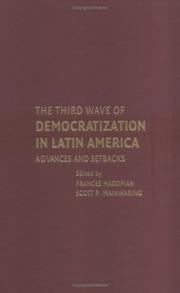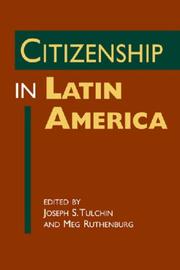| Listing 1 - 4 of 4 |
Sort by
|

ISBN: 0511584865 051100334X 9780511003349 0521414296 9780511584862 9780521414296 0521414296 9780521032889 0521032881 Year: 1996 Publisher: Cambridge Cambridge University Press
Abstract | Keywords | Export | Availability | Bookmark
 Loading...
Loading...Choose an application
- Reference Manager
- EndNote
- RefWorks (Direct export to RefWorks)
This 1996 book is about politics in Brazil during the military regime of 1964-85 and the transition to democracy. Unlike most books about contemporary Brazilian politics that focus on promising signs of change, this book seeks to explain remarkable political continuity in the Brazilian political system. It attributes the persistence of traditional politics and the dominance of regionally based, traditional political elites in particular to the manner in which the economic and political strategies of the military, together with the transition to democracy, reinforced the clientelistic, personalistic, and regional basis of state-society relations. The book focuses on the political competition and representation in the state of Minas Gerais.
Elite (Social sciences) --- Patron and client --- Authoritarianism --- Political science --- Authority --- Clientela --- Clientelism --- Patronage, Roman --- Brazil --- Politics and government --- Autoritarisme --- Elite (Sciences sociales) --- Patron et client --- Brésil --- Politique et gouvernement --- Social Sciences --- Political Science
Book
Year: 1987 Publisher: Notre Dame University of Notrte Dame. The Helen Kellogg Institute for international studies
Abstract | Keywords | Export | Availability | Bookmark
 Loading...
Loading...Choose an application
- Reference Manager
- EndNote
- RefWorks (Direct export to RefWorks)

ISBN: 0521824613 0521613205 9780521613200 9780521824613 9780511791116 1280415371 9781280415371 0511791119 9780511127854 0511127855 9780511127328 0511127324 0511302819 9780511302817 9786610415373 6610415374 1107146429 9781107146426 0511182155 0511199384 Year: 2005 Publisher: Cambridge Cambridge university press
Abstract | Keywords | Export | Availability | Bookmark
 Loading...
Loading...Choose an application
- Reference Manager
- EndNote
- RefWorks (Direct export to RefWorks)
The late twentieth century witnessed the birth of an impressive number of new democracies in Latin America. This wave of democratization since 1978 has been by far the broadest and most durable in the history of Latin America, but many of the resulting democratic regimes also suffer from profound deficiencies. What caused democratic regimes to emerge and survive? What are their main achievements and shortcomings? This volume offers an ambitious and comprehensive overview of the unprecedented advances as well as the setbacks in the post-1978 wave of democratization. It seeks to explain the sea change from a region dominated by authoritarian regimes to one in which openly authoritarian regimes are the rare exception, and it analyzes why some countries have achieved striking gains in democratization while others have experienced erosions. The book presents general theoretical arguments about what causes and sustains democracy and analyses of nine compelling country cases.
Democratization --- Démocratisation --- Latin America --- Amérique latine --- Politics and government --- Politique et gouvernement --- Démocratisation --- Amérique latine --- Democratic consolidation --- Democratic transition --- Political science --- New democracies --- History --- Social Sciences --- Political Science


ISBN: 162637130X 9781626371309 9781588264909 1588264904 Year: 2022 Publisher: Boulder
Abstract | Keywords | Export | Availability | Bookmark
 Loading...
Loading...Choose an application
- Reference Manager
- EndNote
- RefWorks (Direct export to RefWorks)
Is democracy in Latin America in trouble, as many now argue? Or is the increasingly overt political participation of both "average" and marginalized citizens evidence to the contrary? This important collection focuses on citizenship to shed light on the dynamics and obstacles that the region's democracies now face. The authors place citizenship in the context of democratic theory and explore varying conceptions of the term. They also consider a range of challenges to meaningful citizenship. In the final section of the book, practitioners reflect on their experiences in advocating for a more active citizenry, and on ways to promote citizenship in Latin America.
| Listing 1 - 4 of 4 |
Sort by
|

 Search
Search Feedback
Feedback About UniCat
About UniCat  Help
Help News
News